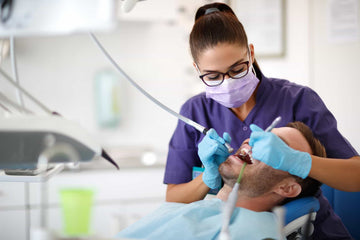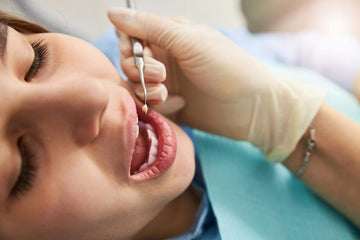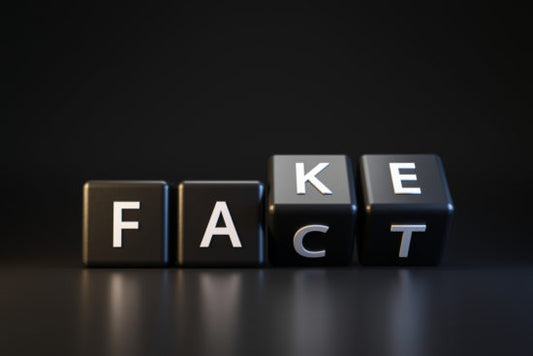Adult Dental Care: How to Maintain Healthy Teeth as You Age

It’s no secret that keeping your body in tip-top condition only gets more challenging with age - oral care being no exception.
While eating well and regular exercise are a staple part of a long and healthy life, it’s easy to neglect the importance of adult dental care.
Here, we’ll break down all you need to know about your oral hygiene, what happens to your teeth as you get older and how to keep your teeth sparkling and your mouth healthy.
What happens to your mouth as you age?
Just like the rest of your body, your mouth undergoes many changes which can make it more difficult to keep your teeth as clean and as healthy as you’d like.
Unfortunately, it can be challenging to spot the tell-tale signs of an ageing mouth and teeth. Luckily, we’re here to shed some light on what to look for when evaluating your overall oral health.
Wear and tear
Although your teeth are made primarily of tough enamel — not bone like many of us think — they are prone to damage over time if not properly looked after.
A lifetime of biting, chewing and grinding can damage the enamel. This causes it to flatten or smoothen over and can even result in chips or breaks in the worst of cases.
Although you can never fully rejuvenate damaged teeth without specialist help from a qualified dentist, you can lessen further damage with the right treatment and practising good oral hygiene — so, all hope is not lost.
Changes to your facial structure
As we age, our jaw structure changes.
Your lower jaw naturally continues to grow forward and usually gets narrower — causing your teeth to be pushed into different positions. Combine that with a lifetime of chewing and it can result in tooth damage if not spotted by a professional.
Changes in the structure of your jaw often cause changes in how you bite. For example, a protruding lower jaw can exacerbate issues like teeth grinding. This can wear down the enamel and lead to tooth decay if not treated early.
Increased buildup of plaque and bacteria
As we age, our mouth gets naturally drier.
The bad news is that saliva plays a critical role in fighting off harmful bacteria and keeping infections in check. Without it, there’s an increased risk of tooth decay, fungal infections in the mouth and bad breath.
Gum issues
Although often overlooked, looking after your gums is a critical part of adult oral care.
They form a tight seal around the bottom of teeth to prevent bacteria from reaching the roots and delicate blood vessels — commonly known as the “pulp” of the tooth.
As we age, gums recede — exposing these sensitive areas to bacteria, which can result in infections and ongoing pain if not treated properly.
How to Maintain Healthy Teeth as You Age
The good news is that damage can be limited and almost prevented completely with the right professional attention and a proper crash-course in how to take care of your teeth.
Here are some adult dental care tips to help keep your teeth as healthy as possible and halt the effects of age in its tracks.
Maintain a Consistent Oral Hygiene Routine
Brushing your teeth twice a day with fluoride toothpaste helps remove plaque — that sticky film of bacteria that forms on your teeth. Plaque can lead to gum disease and cavities if not properly managed, so use a soft-bristled electric toothbrush, making sure to replace the head every three to four months.
Don’t forget to floss daily to help clean between teeth that your toothbrush can’t reach. If you struggle flossing, use an interdental brush or a water flosser for easier access.
Stay Hydrated to Prevent a Dry Mouth
A lack of saliva can lead to tooth decay, gum disease, and bad breath.
It’s important to stay hydrated and drink water throughout the day to prevent your mouth from drying out.
Another trick is to chew sugar-free gum as this has been proven to stimulate saliva production.
It’s also important to limit alcohol and caffeine intake, as these can worsen dry mouth.
Eat a Tooth-Friendly Diet
A balanced diet is essential for oral health, especially as you age. Calcium and vitamin D are crucial for maintaining strong teeth and bones – so make sure you’re getting plenty of nutrients.
It’s important to limit your intake of sugary foods and drinks to prevent cavities and enamel erosion, which become bigger concerns as you age. If you indulge in these foods, rinse your mouth with water afterwards to neutralise acids.
Be Gentle on Your Gums
With age, gum recession is common, exposing the roots of your teeth and making them more vulnerable to decay and sensitivity. Gently use an electric toothbrush to provide a deep clean without aggravating your gums.
If you experience bleeding gums or increased sensitivity, talk to your dentist who can run you through treatments for possible gum disease.
Visit the Dentist Regularly
Regular dental check-ups are vital as they allow your dentist to monitor for age-related issues such as gum recession, dry mouth, and even oral cancers.
They’ll be able to help offer professional cleans and even restorative treatments like fillings, dentures and partials to ensure your gums and bones remain healthy.
Your dentist can also detect early signs of tooth decay, gum disease, and other oral health issues, often before they cause noticeable symptoms.
Why choose Enlighten?
Don’t like the look of your teeth and searching for a fix to get you feeling your best?
Enlighten’s technology-leading teeth whitening systems are designed to deliver results with cutting-edge, minimally invasive treatment.
For more information on maintaining stellar oral health and details on our product lines, why not read some of our guides?
Find an Enlighten provider near you that will help you take the next steps to a healthier whiter smile!
FAQs
1. Is it Possible to Make Your Teeth Healthy Again?
Unfortunately, once the enamel is gone, you can’t grow it back. However, if your teeth are only slightly damaged, it is possible to strengthen them back and slow the process of tooth damage or decay. This involves a few lifestyle changes, such as eating a tooth-friendly diet, limiting smoking and alcohol consumption and hydrating the mouth, to remineralise the teeth.
2. Can Terrible Teeth be Saved?
If tooth decay has ravaged a tooth from the enamel to the pulp, there’s no way of saving the tooth. To avoid further infection and toothache, you may need a surgical procedure — like a root canal — to stop the infection and protect the sensitive pulp and dentin layers of your teeth.
› DIG DEEPER ‹
![]()
Learn more about the Enlighten Teeth Whitening System HERE.
And to find an Enlighten whitening expert near you, hit the link below.
FIND A DENTIST

Or if it’s mini smile makeovers you want to dig deeper into, then give it a click right HERE.
_________________________________________________________________________






